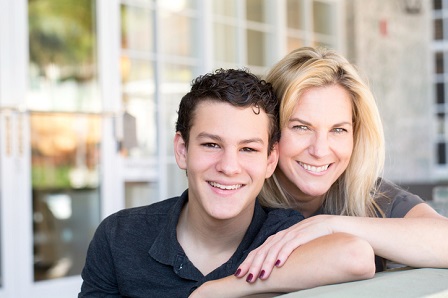We hear a lot about the difficulties of parenting teenagers, how hard it is to cope AND stay sane in the process (both of you!).
Is there even such a thing as being able to enjoy your teenager?
What about when your teen says they hate you? What about when they become moody, behave erratically (find out more in my article, “The Teen Years Explained”), or are sometimes downright defiant?
None of this means that they hate you, their parent/s. In the heat of the moment they may think they do, or even say that they do, but this is not the case.
Tips for Parenting Teenagers
No matter how unloveable your teenager might be acting, they still need your guidance and love – in fact more love than ever, to help them though these troubled times. Here are some tips to help you handle and even enjoy your teenager:
Listen without judging: Sometimes it is best to do more listening and less talking. In our desire to help and protect our teens, we forget to pay attention to what they are really saying and we rush in with advice or criticism. This is likely to immediately put the barrier up on their side, leaving them feeling misunderstood and not acknowledged.
Rights and responsibilities: Give them rights or privileges, according to their level of maturity and responsibility. Discuss with your teen how rights come as a package with responsibilities, and if they want to be treated like adults, they have to prove themselves to be responsible like an adult.
Negotiate, don’t dictate: Negotiate the limits and boundaries with your teen. Unlike when they were small, and as a parent you dictated or imposed the rules, let your teen have a say in the matter. At the same time, ask them to come up with a fair consequence if they breach the rules.
Open the discussion by letting your child know what your expectations are – eg “I would like you to be home by 9pm” (depending on the age, level of maturity etc) – and then asking them what they think of that. Give them the opportunity to share their opinion; ask for their rationale and present yours. If they don’t agree at all, settle on a compromise that would satisfy both parties (eg “Okay, you get to stay out 30 minutes longer, but I want you to call me at such and such time”).
The point of this is to keep your teen involved in making decisions that concern them – if they agree to it, and they have some control over what happens in their life, they are much more likely to stick to their end of the bargain.
Some rules are not negotiable: As adults, some rules are just not negotiable – for example, drivers need to stop at red lights. So make it clear to your teen, that some things are not negotiable, and what these might be. They are best kept at a minimum, and your adolescent provided with a rationale for it – again, as a dialogue, not as a lecture. In my work with adolescents, if there is one thing that they complain about, it is their parents lecturing and not listening to them.
Don’t minimise their stress and concerns: It may seem trivial to a parent that their child’s biggest worry is that the current boyfriend did not reply to their text in the last five minutes, particularly when parents are struggling with paying bills, and keeping their job. But, as adults, we need to keep it in perspective. These are OUR worries as adults with families, it is our own backpack to carry. Their backpack does not have to include OUR worries to make them relevant, their own worries are enough.
And as teenagers, they do have age-appropriate worries. It is not fair to judge them from our perspective, since they are not at that point in life yet.
Just talk: Talk to your teen – ask them about their likes and dislikes, their hopes and dreams, and what makes them tick. Encourage their interests, give advice if asked for it, show interest in who they are as a whole, and generally foster the positives.
One caution – as parents, we are always concerned about how our children are going at school. High school is a time of really intense stress for teens, as they are preparing for their OP, deciding on their future, and beset by the expectations set by parents, teachers and even themselves. While we may want to know how school went, this is probably the last thing they want to talk about. So, perhaps, instead of greeting them with “Hi darling, how was school today?”, we could try something along the lines of “Hi darling, I missed you, how are you?”.
Of course, that does not mean that school issues should be left unaddressed, but there is a time and a place for everything, and putting too much focus on this part of their lives (which may be their least favourite) may convey the message that we only care about their performance.
Support them through bad decisions. It is part of the development and maturation process, and natural for your teen to want more independence, and to make decisions about things that concern them. This is also the only way that they can learn how to make well informed and balanced choices. As with any other learning process, mistakes are inevitable and they will make some wrong decisions at times. In such a situation, support rather than criticism and “I told you so!” is best. Although they may have done something against your best advice, it is their decision and they have to live with the consequences. It is also a good life lesson that they need to learn at some point. (I am of course not talking here about life threatening choices, like drugs or prostitution which require a different approach, but the usual ones that all adolescents face at this stage.)
Contrary to popular belief, the journey through adolescence does not have to be a war zone.
Remember, teenagers are no longer children – but they are not yet adults. Our role as parents is to support them through this process, and gradually allow them more freedom and independence while helping them stay safe. Collaboration, communication and mutual respect are the best tools we can use, to ensure our adolescents grow up into good adults.
 Author: Alexandra Ellermann, M Psych (Clin), AMAPS.
Author: Alexandra Ellermann, M Psych (Clin), AMAPS.
Brisbane Psychologist Alexandra Ellermann has extensive experience in working with children, adolescents, adults and families with a range of challenges, including surviving the teen years, as well as more complex conditions such as Autism Spectrum Disorder, ADHD, intellectual disability, developmental delays, trauma and abuse.
To make an appointment try Online Booking. Alternatively, you can call Vision Psychology Brisbane on (07) 3088 5422.
